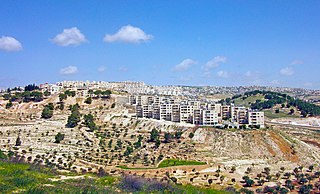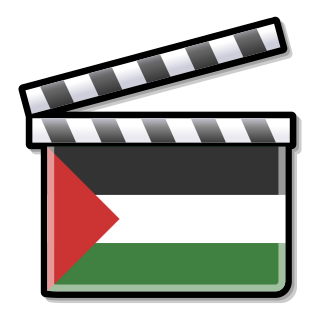
Tamer Nafar is a Palestinian rapper, actor, screenwriter and social activist of Israeli citizenship. He is the leader and a founding member of DAM, the first Palestinian hip hop group.

Beit Sahour or Beit Sahur is a Palestinian town east of Bethlehem, in the Bethlehem Governorate of the State of Palestine. The city is under the administration of the Palestinian National Authority. The population was of 13,281 in 2017, consisting of approximately 80% Christians and 20% Muslims.

Har Homa, officially Homat Shmuel, is an Israeli settlement in southern East Jerusalem, near the Palestinian city of Beit Sahour. The settlement is also referred to as "Jabal Abu Ghneim", which is the Arabic name of the hill. One purpose given for the decision approving of its establishment was to obstruct the growth of the nearby Palestinian city of Bethlehem.

Khaled Abu Toameh is an Israeli Arab journalist, lecturer and documentary filmmaker.
Arab cinema or Arabic cinema refers to the film industry of the Arab world. Most productions are from the Egyptian cinema.

Cinema of Palestine is relatively young in comparison to Arab cinema as a whole. Palestinian films are not exclusively produced in Arabic and some are even produced in English and French. Elia Suleiman has emerged as one of the most notable working Palestinian directors.
Qustandi Shomali (Arabic: قسطندي شوملي, is a Palestinian professor of history at Bethlehem University.

Shalom Abu Bassem is a documentary by Nissim Mossek about the Israeli–Palestinian conflict that follows a New York City Jewish settler and an Arab hummus vendor that are forced to live as neighbors in the heart of Jerusalem. The documentary spans a nearly 20-year period, beginning before the First Intifada, to demonstrate how the nation's politics affect their neighborly relations. The film won Best Editing at the Haifa International Film Festival.

Annemarie Jacir is a Palestinian filmmaker, writer, and producer.
Michel Khleifi (Arabic: ميشيل خليفي}, born in 1950 in Nazareth, is a Palestinian of Israeli citizenship film writer, director and producer, presently based in Belgium.

The Abu Dhabi Film Festival, formerly the Middle East International Film Festival (MEIFF), was an international film festival held in the city of Abu Dhabi, United Arab Emirates from 2007 to 2015.
The Unified National Leadership of the Uprising is a coalition of the local Palestinian leadership. During the First Intifada it played an important role in mobilizing grassroots support for the uprising. In 1987, the Intifada caught the Palestine Liberation Organisation (PLO) by surprise, the leadership abroad could only indirectly influence the events. A new local leadership emerged, the Unified National Leadership of the Uprising (UNLU), comprising many leading Palestinian factions. The disturbances, initially spontaneous, soon came under local leadership from groups and organizations loyal to the PLO that operated within the West Bank and Gaza Strip; Fatah, the Popular Front, the Democratic Front and the Palestine Communist Party. The UNLU was the focus of the social cohesion that sustained the persistent disturbances. After King Hussein of Jordan proclaimed the administrative and legal separation of the West Bank from Jordan in 1988, the UNLU organised to fill the political vacuum.
Paul Cowan is a Canadian filmmaker who spent the bulk of his career with the National Film Board of Canada.

Hisham Zreiq, also spelled Zrake, is a Palestinian-Israeli Independent filmmaker, poet, animator and visual artist. He began working in computer art in 1994, and in 1996 started exhibiting his work in galleries and museums. In 2007 he filmed his first documentary, The Sons of Eilaboun, and in 2008 he created the short film Just Another Day, dealing with the life of Arabs living in western world after September 11 terror attacks. He uses his poetry and visual art in his films, as in Just Another Day, and was a member of the Culture Unplugged film festival panel. In 2018 Zreiq contributed to the book An Oral History of the Palestinian Nakba by writing a chapter based on the interviews from his documentary The Sons of Eilaboun. In 2023 he started a music project called 'Goddess Asherah'

Teta, Alf Marra is an Arabic documentary film about a feisty Beiruti grandmother.
Mahmoud Kaabour is a filmmaker, writer, and public speaker from Beirut.
Scandar Copti is a Palestinian filmmaker, film writer, actor and producer who examines social problems of Arab society in Israel through his film works.
Amer Shomali is a Palestinian interdisciplinary visual artist who uses conceptual art, painting, digital media, films and comics to explore Palestinian sociopolitical issues and revolution iconography.
Azza El Hassan, born April 21, 1971, in Amman, Jordan is a Palestinian documentary filmmaker, cinematographer, producer and writer. Her documentary films mostly reflect her experience living in exile and her experience living in Palestine. One of her best known works is Zaman al-akhbar (2001).

Beer in the State of Palestine is manufactured by Palestinian microbreweries – most traditionally Taybeh Brewery, established in 1994, and Birzeit Brewery, since 2015. Several beer festivals are held annually in Palestine, including an Oktoberfest-style event hosted by the Taybeh Brewery.












